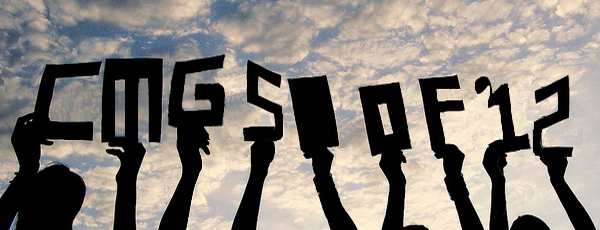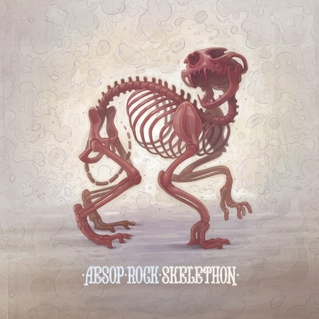
Features | Lists
By The Staff

50 :: Lambchop
Mr. M
(Merge/City Slang)
Patience is not a highly valued quality in popular music, either in musicians or fans. There’s a mythology, even, built up around the idea that some of the greatest music is the product of furious all-night brainstorming sessions, in-studio pressure cookers, or lost-weekend jam-fests. “Yesterday,” one of the most popular songs of the rock era, famously came to Paul McCartney in a dream. Whether that’s true or not doesn’t matter; there’s a commonly held notion that the best music comes courtesy of divine inspiration, that undercooked is better than overworked. That gratification should be immediate.
Kurt Wagner and his band Lambchop prove that you can, in fact, make great music with patience, with dedication, with a very un-rock ‘n’ roll attitude. Though he’s spent twenty-five years as a musician, Wagner was a visual artist first, and he treats his output in both arenas with the same nurturing tenacity: weeks, months, sometimes years are spent developing one song, let alone an entire record. Lyrically, this means delicately shading and sharpening, crafting the perfect observation or punchline; musically, it means crafting a particular sonic landscape, without a string or cymbal out of place, for each specific song.
Though this process sounds completely exhausting the results are often inspiring. Mr. M, another brilliant headphones album—a Sunday morning crossword album, really—rewards repeat listens more than any other record this year, as bit by bit Wagner’s astute details and cutting asides come sharply to the fore. In “If Not I’ll Just Die” what seems like a cryptic old-timey tune about a coffee maker becomes a funny and loving ode to adult family relationships; “Buttons,” a rumination on a fuck-up ex-friend, becomes a masterpiece of passive aggression.
Mr. M is not hard to like by any means, yet it’s a record that required patience to make and asks the same of its listeners. Those who stick with it are rewarded with a complex, gorgeous, yet bleakly comic study of the human condition.
► “If Not I’ll Just Die”
► “Gone Tomorrow”
Maura McAndrew

49 :: Action Bronson & Party Supplies
Blue Chips Mixtape
(Fool's Gold/Reebok Classics)
A good deal of Blue Chips is pointedly irrelevant: hear Action cop to his favorite foods, as he name-drops wrestlers, hookers, and hashes out an unflinching assessment of someone’s butthole. What can you say to that? The guy has found his voice, and it is unwaveringly bullshitty (in the best, least bullshit way). And across these 17 tracks and 45 minutes—the most Bronson-like of the two very good mixtapes dude put out in 2012—that voice is rendered total, eschewing all common sense, even as it advances more steadily upon something sticky, sweet, and resinous. And if that quality is this guy’s glutton-rap charisma, a natural-born gift, or more simply the weed he’s inhaling very audibly all over this thing, is yet to be decided. It’s not like Blue Chips is perfect, and it is probably a bit over-long, a bit too scattered, and a bit too run-up on its mix of YouTube-sourced samples and Action’s bumper to bumper way of saying the same kinda thing, over and over again, for its own good. (There is also a Kool AD guest spot, which just plain sucks.) It’s a bit too much at 8 AM on Monday morning, but it’s exactly right for the weekend or whenever you might be flying off on a tangent about your distant Albanian relatives—as sound-tracked by a weird, Roy Orbison-ey beat from Party Supplies (“9-24-11”). This is Action Bronson’s name-grab moment, and it delivers.
► “Thug Love Story 2012”
► “9-24-11”
Alan Baban

48 :: Each Other
Heavily Spaced EP
(Crikey!)
Two years into their career, Each Other’s ecstatic post-pop is still pretty hard to nail down. You could liken the Montreal trio to other exuberant pop experimentalists like Deerhoof or Dirty Projectors, but there’s something strange and magical and unique about Each Other, something not easily wrapped up in imagining that This Heat had ventured into sunny psychedelia (…though that’s not a bad start). This year’s predictably awesome Heavily Spaced doesn’t bring us any closer to deciphering Each Other’s gleefully twisted inner-workings, but these merrymaking fellows work hard to disguise the process, allowing us to just sit back and enjoy the ride.
There’s an ebullient brightness about the puzzling verbosity that perforates the band’s mind-bending outsider pop, and tracks like “Ash Mound” prove how the band can make repetitive, angular instrumentation bend and fold into bright origami shapes with the aid of twisting harmonies. The plaintive supplications of “An Instant” exemplify the secret to this band: that such weird songs have no right being so damn catchy. “A Strong Spinning” is fourteen of your favorite songs’ choruses laced together in one incredible mosaic of endless hooks. For those victories and many more, Heavily Spaced is just the next welcome entry in a winning streak that doesn’t seem likely to end soon.
P.M. Goerner

47 :: Purity Ring
Shrines
(4AD)
Maurice Blanchot once said, “The purest writers are not entirely inside their works.” What Megan James of Purity Ring is inside of is, essentially, herself.
Nimbly playing consonants like A$AP with vowels, or like Nabokov in his intro to Lolita (“My sin, my soul. Lo-lee-ta: the tip of the tongue taking a trip of three steps down the palate to tap, at three, on the teeth. Lo. Lee. Ta.“), James lyrically navigates herself like a cartographer; like a doctor presiding over an autopsy. To a staggering degree of anatomical clarity and clinical self-awareness, Shrines is an exacting electro-pop narrative—or dancing medical-science illustration—of James’s visceral experiences, restlessness, and internalized night-terrors. And even of her actual, uh, viscera.
Formerly of Born Gold (also formerly Gobble Gobble), James and fellow Edmonton-born Corin Roddick have eschewed the light-up jacket and props band for, I guess, another props-heavy, experimental-electronic endeavor. But what Purity Ring delivers is crave-inducing pop with un-asked-for complexity, amidst all the sexual duress and mesmerizing facets. The scattershot claps, Blockbreaker blips, deep bass, and the twist of nymph-like dance production gyrate around James’s vocals—where sumptuousness occurs, it is in Shrines‘s hip-stirring sum. Lyrically, the reality and the unmasked imagery of desire and body-fixation are thrown under bright lights; delivery-wise, she sings with needle-point precision and through unabashedly cute vocal alterations, her tone carrying on like she’s oblivious to the graphic displays about her.
James and Roddick are aware of this “cuteness”; the track titles (e.g., “Amenamy,” “Belispeak,” “Saltkin,” etc.) could easily be names of Dance-Pop Pokemon or a character from a tween fanfic version of The Hobbit. In countless ways, Purity Ring embraces the fantastical, the delightful, and the titillating as well as the investing of preciousness or magic. What’s sacred is internal—“a shrine,” “a cult”—and all these things take very real root in the guts. To this band, those internal spaces and entrails are equally praise-worthy, worshipful, and terrifying. And there is something delicious in that tight juxtaposition of adorable-ness and hunger. Much about Shrines is like the witch’s candy house in Hansel and Gretel, where there is an innocent craving and pupil-enlarging whimsy—but what’s inside is all adult appetite and furnaces stoked for consumption. Eat it up.
Kaylen Hann

46 :: Perfume Genius
Put Your Back N 2 It
(Matador)
Put Your Back N 2 It is a devastated album. From every end: gnawed to the quick, emotionally toe up; Mike Hadreas’s is an earth salted over and over. His voice is, not without warrant, compared to Antony’s quite a bit, and the similarities work handily for both, their performances laying even barer the stark, terrified feelings they repeatedly beat into the pavement of their respective metropolii. Hadreas’s is Seattle, and so obligatory is his adherence to damp sad-scapes he must be reacting to the horror around him, both desultorily and, as he so frankly, beautifully sings, “with grace, no tears on my face.” Another comparison is to Jamie Stewart, who shares a penchant for blunt catharsis, at least in how unrelentingly they turn tragedy into objects to mull over—from a distance at that. “String it up on a fence, cover it with semen / I am done, I am done with it,” and not too much later he slips into pleading, “Take me home, tend to me / Baby, lay me down easy,” before admitting his loneliness, or just giving up: “All alone / I walk aimless / I work the corner of an endless grid.” Which may be much to swallow, “swallowing” itself about as game a metaphor for some of this album’s implied intimacy as the goofy Prince-like title. But how it sounds when he cries out these aching, ragged notions? Hadreas answers, “the love you feel is stronger,” which is also his answer to, I’m guessing, or so it seems, someone, a friend and loved one, who’s suffered sexual abuse. He then offers to “take the dark part of your heart into my heart.” And how that sounds? It carried me through 2012; it’s absolutely ravaging.
Dom Sinacola

45 :: Japandroids
Celebration Rock
(Polyvinyl)
Few records released in 2012 were as accurately named as Celebration Rock, Japandroids’ arena-ready response to their debut’s surprise success. Over the course of the album’s eight songs, guitarist Brian King and drummer David Prowse do everything in their power to make good on the title’s promise, with an abundance of wordless choruses seemingly tailored to sound best when an audience sings them back at the top of its lungs, an onslaught of simple chord progressions that never sound quite as easy as they are, and a lot of words about love, drinking, love of drinking, and love and drinking. That it’s a high-energy affair—one in which practically every line is met with a drum fill and a shouted “whoa”—should be clear from the sounds of fireworks used to bookend the album.
Yet despite their very real potential to be indie rock’s LMFAO, Japandroids write songs that aren’t just big dumb choruses. Totally cheeseball moments like the shout-along “we yell like hell to the heavens!” on opener “The Nights of Wine and Roses” get a pass, while “It’s a lifeless life with no fixed address to give / But you’re not mine to die for anymore, so I must live” rings utterly triumphant in the face of a breakup in the bridge of “The House That Heaven Built.” Like their wordier peers in the Hold Steady, there’s a palpable sense that King and Prowse get so much joy from what they do that they can’t help but push forward; they’re Mclusky admirers who don’t shy away from dealing in anthems. Party rock is in the house tonight, indeed.
► “The House That Heaven Built”
► “Younger Us”
Andrew Hall

44 :: Aesop Rock
Skelethon
(Definitive Jux)
In the past, through the deeply entangled webs of Surrealist non-sequiturs and all-encompassing stoned/pissed-off take-downs, you could always discern the typical pre-occupations of the idealistic backpacker in Aesop Rock’s rhymes. There was always some implicit, generalized “you,” some ultimate statement to be had through carnival distortions about craft and single-mindedness. Labor Days (2001), after all, took its main theme as work, both the kind necessary for survival and the kind necessary for, well, survival.
Not so on Skelethon, which is only about hip-hop insofar as it’s Aesop wondering what the hell happened to the people he used to run beside. It’s a rallying cry on “Zero Dark Thirty” (in which Aesop may or may not be comparing himself to bin Laden in his last moments): “down from a huntable surplus to one.” The album’s main impetus is the suicide of a best friend and Aesop’s own isolation, twin deaths for which the only consolation is a monotone Kimya Dawson singing, “Birds of a black feather stick together / Forever and ever and they always remember you / And all of the shit you do” over the prickliest guitar riffs outside of a This Heat song. A lonelier rap album you haven’t heard: remember when Ghostface was all “Scientific / My Hand Kissed It / Robotic let’s think optimistic” over some of RZA’s most mystical shit? Imagine an album at the opposite end of whatever pole that lies on.
Here Aesop’s wordplay seems to turn on him, pulp references and warped 10-cent phrases drained of their aloofness, reflecting back on the profoundly self-consuming mind from which they sprang and rendering even the lighter songs where he tackles doughnuts and mummified cats seem like furiously scrawled postcards from past the point of no return. A lot of the lyrics seem to be about desperation, but only obliquely, thus moments of blunt confession feel like they were blurted out in a moment of weakness. At first “Cycles to Gehenna” appears to be a chance just to riff on motorcycle culture but then the ghosts keep coming back: “Here is how a great escape goes when you can’t take your dead friends names out your phone.” Incidentally, Gehenna is the valley outside of Jerusalem where apostates and followers of the old order brought their children to be sacrificed by fire. “Daylight” this is not.
But nowhere does his defenses fall so completely as on closer “Gopher Guts,” which goes from his typical self-deprecating morbidity (“To Mom ‘It’s me, I accidentally sawed a woman in half’ / She said ‘I’ll keep you in my prayers’”) to a third verse that drops any pretence or innuendo, laying out the naked circumstances of the album’s creation (“I have been completely unable to maintain any semblance of relationship on any level / I have been a bastard to the people who have actively attempted to deliver me from peril”) in a way that’s all the more brimming with clarity for being preceded by 50+ minutes of fever dreams and thinly-veiled psychological projections. On Skelethon, Aesop’s lyrics are just like the small creatures he cups in his hands in his backyard: “inventive,” “electric,” “gracious,” “exalted,” “special.” But then he lets them back into the wild to see nature take its course brutally and indiscriminately.
“Oh.”
► “Zero Dark Thirty”
► “Cycles to Gehenna”
Joel Elliott

43 :: Walkmen
Heaven
(Fat Possum)
We’re getting older. Every day, every hour, every minute, every second: life, in its most elemental manifestation, is simply a succession of moments we can’t get or take back, whether we want to or not—which is why so many people turn to faith and religion. Artists are no exception to the effects of aging, let alone the attendant feelings of loss, loneliness, and anxiety our uncertain destinies provoke. The Walkmen seem to understand this process better than most bands. Their catalog up to now has essentially been a series of aural documents outlining an idealized process of male maturation, of youth not in retreat but in repose. Though their early records bred unruly fits of antagonism and a general spirit of restlessness—usually manifest in self-contained last gasps of adolescent aggression such as “The Rat”—this has been a band, from the beginning, with uncommonly astute perspective. Their first record, lest we forget, was titled Everyone Who Pretended to Like Me Is Gone (2002).
And now, ten years later, a culmination: Heaven, the Walkmen’s sixth full-length, is a forlorn, meditative travelogue for a band who’ve ascended and, in the process, transcended their days of nascent, purgatorial next-big-thing associations to take their rightful place among the rarefied air of paradigms-turned-prodigals-turned-survivors. At this point it’s difficult to remember a time when the band’s ad-hoc mix of waltz-time balladry, sea-shanty serenades, bluesy rave-ups, and indie-rock disenfranchisement was potentially fashionable, but they’ve long-since abandoned any attempt at posturing, if that was ever a conscious stance to begin with. “Not in line with history / Not in line with make believe,” Hamilton Leithauser soulfully bellows on “Line By Line,” a lyric confidently reflected in the spirit of this slow-burning collections of torch songs, and perhaps even more so indicative of a band who have made a career out of marching to a beat just out-of-step with your typical indie fare.
Maturity and a stately demeanor have been somewhat dubious traits in this realm lately (see Wilco, Fleet Foxes, arguably even Grizzly Bear), but the weariness and growing pains associated with this process have so thoroughly infused the band’s leisurely gait and reflective nature that their power now lies within this very same unique sense of patience. The band has been forthright with how their respective lives have changed over the past couple of years. Many of them are now married, some of them fathers, and while music is still obviously their chosen profession, the life of a touring band just isn’t the priority it once was. Their concerns have understandably changed and their themes have followed suit. Heaven is a record about love: losing it, finding it, letting it go, but eventually embracing it. It can come in many forms: jaded (“Love Is Luck”), guarded (“Heartbreaker”), yearning (“Song for Leigh”), selfish (“The Love You Love”), improbable (“Dreamboat”). “Our children will always hear / Romantic tales of distant years,” Leithauser sings on the title track. Taken at face value, it’s a heartwarming and perhaps individualized sentiment. But then it hits you: this is music to grow with, to pass down. In an era of uncertainty, this is music worth putting your faith in.
► “We Can’t Be Beat”
► “Heaven”
Jordan Cronk

42 :: Zammuto
Zammuto
(Temporary Residence)
Within this list of 50 records, you’ll probably read us write a lot about sad people. Just…fucking miserable flesh-sacks. Total downers. And maybe 2012 was an overwhelmingly sad year; or maybe we’re increasingly unable to come to grips with the general pestilence that is the human race, and now we have a popular forum to observe and converse with folks who feel exactly the same way (see: CMG’s new comments feature). It could be both, of course: that we’re just as despairing as ever, but now we’re encouraging one another to indulge in that despair. We’re all listening, Mom; please tell us more about the demise of our once great country. I know I forgot to call Grandma.
Nick Zammuto’s debut album is too boisterous, too wacky even, to consider it legitimately sad—though it does fill that particular space in our hearts where the Books once resided, a loss we all saw coming long before, but one we particularly felt in 2012. Zammuto, of course, is much like the Books at their unbridled best, when melody and aphorisms from some unearthed, ancient, fake culture left little room for sample-heavy choruses. Opening track “Yay” is as immediate and gratifying as anyone should have expected, all gibberish and giggling cymbals. The song, a microcosm of just how meticulously—shit, immaculately—produced the album will quickly reveal itself to be is a burst of celebration emblazoned in blinding white light above our heads; lyrics exist within, somewhere, but euphoria suffices, this robot hymn, the message clear: “It’s all good, it’s all right, crisis solved.”
Which are actually lyrics from “Groan Man, Don’t Cry,” the album’s second and best cut; lyrics closely followed by “…but it’s revolting to watch you complain at the lake.” Here Zammuto emerges as both mantra and weird superhero mythos: “Groan Man, don’t cry / Groan Man, don’t cry / When you’re on your own, leave the past behind / When you walk alone, relax, unwind.” Later Zammuto cries out, in exaltation or probably more like disgust, “Educated Man!” (“Idiom Wind”), while strings close in on his ejaculation, and in “Zebra Butt” the words “Ass” and “Man” find themselves coupled rather closely. “Weird Ceiling” introduces the word “shame” as the bearer of the album’s most eviscerating two notes.
It’s an odd progression, from jubilation to ravaging self-doubt, though never out of character. Nick Zammuto, in fact, has always toyed with structures and names and the meaning manufactured therein, and with Zammuto, amidst what was probably a huge but welcome shift in his career, amidst a year already seemly with sorrow and the inevitable, the guy is toying with himself, with his roles as father and writer and man. He doesn’t take the most flattering tact—Zammuto is sometimes downright unnerving—but he does admit the absurdity in his introspection, imbuing his debut with some of the most satisfying sounds he’s yet stuck his name to. The album may only provide a false sense of levity, but this point, it’s more than welcome.
► “Groan Man, Don’t Cry”
► “Too Late to Topologize”
Dom Sinacola

41 :: Amanda Jo Williams
The Bear Eats Me
(Neurotic Yell)
Back in ’06 Amanda Jo Williams released a debut album, Yes I Will Mr. Man, that cohort Mark Abraham repped pretty hard on this site in ’07; I gave a couple tracks listens and found myself almost immediately put off by what I perceived to be an overbearing level of quirk. It’s about five years later and I don’t know who’s changed more, Williams or myself, but when I listen to her follow-up I no longer hear affectation. I hear personality, real and involving and plenty of it.
Musically, the only comparison I can seem to draw for The Bear Eats Me would be the Muppets band doing their absolute best send-ups of classic country and lite rockabilly, with downright fabulous non-Muppet session work on the lead and slide guitar parts (here handled mostly by some dude calling himself 5-Track, which makes me think maybe he is a Muppet). In and of itself this sound might not hold a ton of long-lasting merit, except that it’s so rooted in the persona of Williams, the instruments swirling around her performance—which, vocally and lyrically, could be described as Emmylou Harris high on helium and other, more hallucinogenic substances. The general impression the record gives off is that of mirth, dutifully measured out and anchored by a rich bounty of grace notes (e.g. the poignant downward chord turn on the opener, the ebullient hooks of the title track, etc.). Sometimes the music’s sonic consistency can verge more on taxing than transporting (nearly every percussive track sounds like some mild variant on thumping bass drum and clapping snare) but within that consistent core is the bedrock of Williams’ confident character, which makes The Bear Eats Me a beacon-like example of how whimsy can sound balanced and nuanced, how humor can be deeply evocative and create fresh narratives in a context outside of rap, and—perhaps most importantly—how modern country/folk can sound vital and distinct.
► “The Bear Eats Me”
► “Hello Good Morning”





